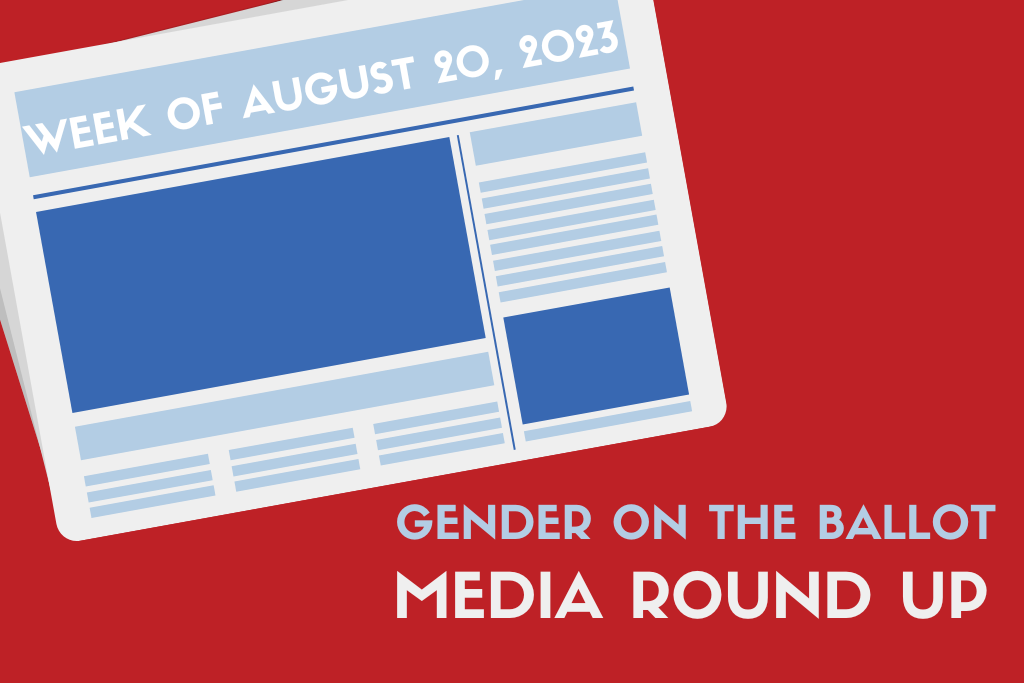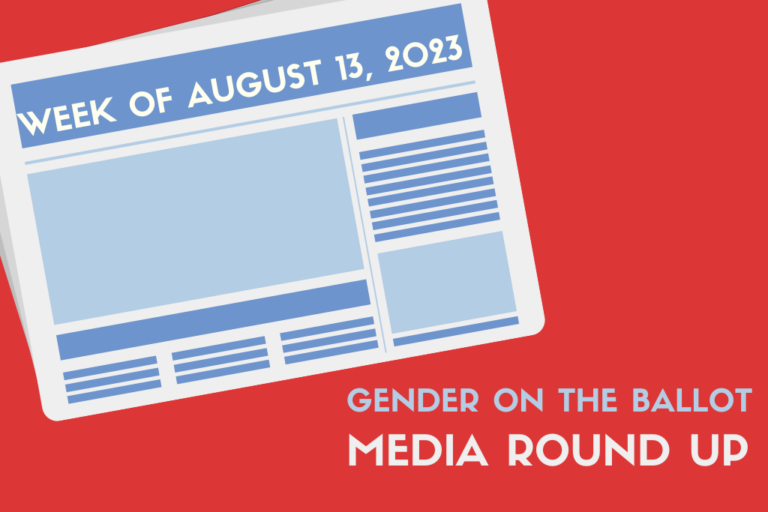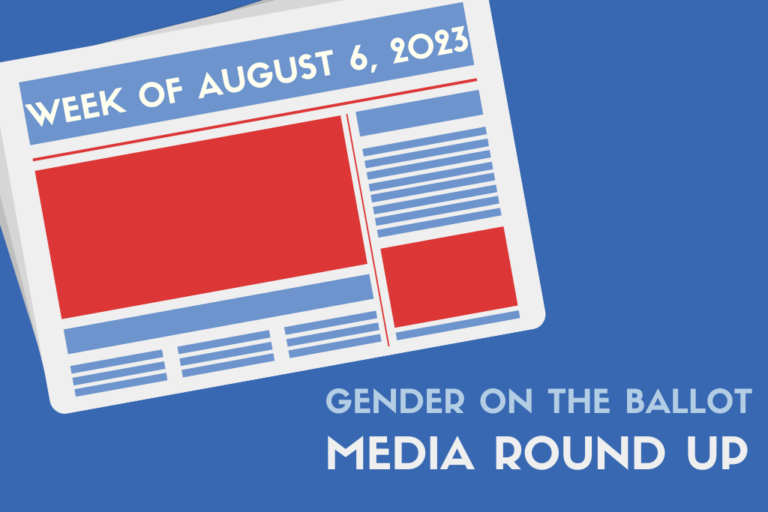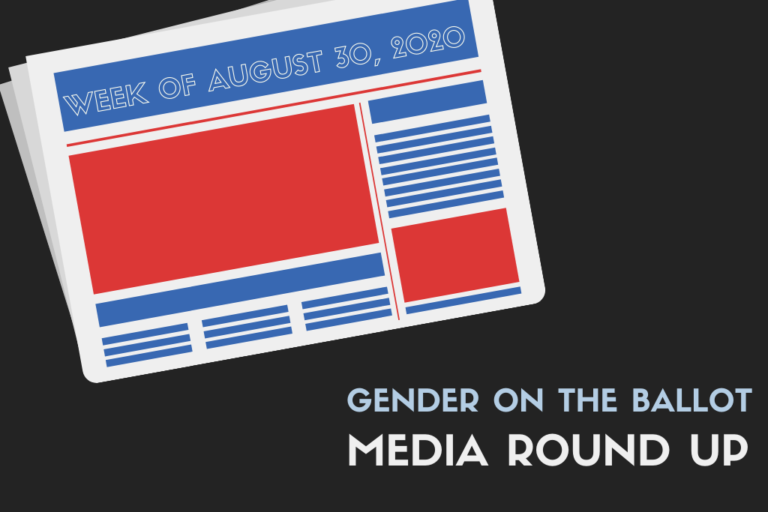Happy Friday! Welcome to our Media Round Up. Each week, we’re collecting and sharing…
Media Round-Up: Week of August 20, 2023

Happy Friday! Welcome to our Media Round Up. Each week, we’re collecting and sharing gender + politics stories. Here’s what caught our eye this week:
More women than men have college degrees. That’s good news for Democrats.
Dante Chinni, NBC News
For years now, analysts have found data that shows more women are attending college than men, the results of which are reshaping the country and politics. The number and percentage of Americans with at least a bachelor’s degree has risen steadily, climbing nearly 30 points in the last 50 years. In 1970, only 11% of Americans aged 25 and older had a bachelor’s degree. A cause for the sharp jump is attributed to more women completing their four-year degrees, with women surpassing men in college completion within the last decade. Data shows that the trend does not look like it will reverse any time soon considering the latest college enrollment figures show a wide divide between the sexes over who is enrolled in college. Reading deeper into the data exposes more trends like who is paying tuition or paying off student loans, who and how many women marry, and who sits in the corner office in the business world since higher positions tend to require more education.
Read the full story here.
The workplace can be rough for menopausal women. Employers are starting to step up
Jeanne Sahadi, CNN
Menopausal symptoms affect about a quarter of the US working population at any given time, and employers are beginning to step up to offer more effort. Women experiencing menopausal symptoms find that they are not adequately acknowledged or treated by the medical community and that the symptoms should be hidden at work. Things are quickly changing however according to a survey from Mercer; fifteen percent of large organizations (4% more than last year) indicated that they are offering or plan to offer benefits to help women experiencing menopausal symptoms.
Read the full story here.
Sexism almost sidelined Black women at 1963 March on Washington. How they fought back.
N’dea Yancey-Bragg and Christine Fernando, USA Today
Although Black women played an integral part in the planning for the 1963 March on Washington, their efforts went largely unacknowledged on the day of the march. It wasn’t until Anna Arnold Hedgeman, a civil rights organizer who mobilized groups of hundreds if not thousands to attend, wrote a letter and read it aloud to the “Big Six” of the Civil Rights Movement arguing for a woman to be added to the speaking program, that Myrlie Evers was given a slot. A few women ended up speaking and performing on the day of the march, but their spotlight was minimal and many women were not okay with the meager recognition of their major contributions to that event and the broader Civil Rights Movement. According to Meghan Weaver, a research assistant at the Martin Luther King, Jr. Research and Education Institute, “The march actually was sort of a galvanizing point for some women of the movement … It was really glaring how women had been pushed to the side.”
Read the full story here.
1 in 5 women report mistreatment from medical staff during pregnancy
Ayana Archie, NPR
According to a survey released by the Centers for Disease Control and Prevention on Tuesday, one in five women experienced mistreatment while receiving medical care for their most recent pregnancy. The signs of mistreatment reported by women included being verbally abused, having their requests for help go unanswered, having their physical privacy infringed upon, and receiving threats to withhold treatment. In addition to this, nearly a third of respondents to the survey reported that they were discriminated against during their maternity care due to their age, weight, income, and race and ethnicity. Some of the CDC’s recommendations to combat these findings are health care systems hiring diverse workforces and more effectively communicating with patients.
Read the full story here.
Abortion Snitching Is Already Sending People to Jail
Morgan Carmen, Ms. Magazine
After the fall of Roe v. Wade last June, reproductive healthcare has become more and more restricted, resulting in abortion access becoming more of a matter of one’s own resources and social networks. Laws that expressly prohibit abortions have led to an increased number of people having later term or self-managed abortions like Celeste Burgess, who last month was sentenced to 90 days in prison for taking abortion pills when she was 17. Thirteen-hundred women were prosecuted between 2006 and 2020 for charges associated with endangering a fetus. These cases mostly involved suspected drug use during pregnancy, with some about refusal to follow medical advice or attempted abortion. It’s predicted that these charges will rise in frequency since states can now target intentional termination directly and prioritize fetal personhood.
Read the full story here.







